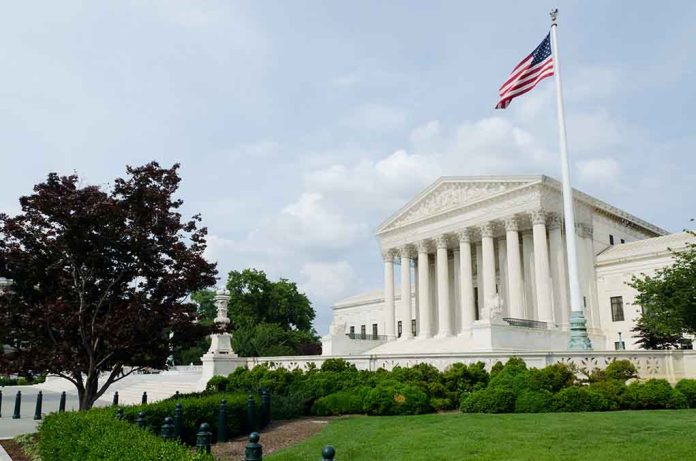
President Trump’s administration asks the Supreme Court to intervene on birthright citizenship as lower courts block his key immigration policy.
Key Takeaways
- President Trump signed an executive order on his first day in office to end birthright citizenship for children of undocumented immigrants and those on temporary visas.
- Federal judges in Maryland, Massachusetts, and Washington state have issued nationwide injunctions blocking the order, calling it “blatantly unconstitutional.”
- Acting Solicitor General Sarah Harris argues the 14th Amendment doesn’t universally grant citizenship to everyone born in the U.S. and that nationwide injunctions exceed constitutional limits.
- The administration is asking the Supreme Court to allow the policy to take effect for all except those who directly sued, claiming individual judges shouldn’t have power to issue nationwide rulings.
- This case marks the first time the legal battle over ending birthright citizenship has reached the Supreme Court.
Trump Administration Challenges Nationwide Injunctions
The Trump administration has formally asked the Supreme Court to review lower court rulings blocking the president’s executive order limiting birthright citizenship. Signed on January 20, 2025, the order seeks to end automatic citizenship for children born to undocumented immigrants and those on temporary visas. Currently, the United States is one of approximately 30 countries globally that apply birthright citizenship, a practice the administration aims to restrict as part of broader immigration reform efforts.
Acting U.S. Solicitor General Sarah Harris filed the emergency appeal to the Supreme Court, focusing on the legitimacy of nationwide injunctions issued by individual federal judges. The administration’s legal team argues these sweeping injunctions far exceed their proper constitutional scope and prevent the Executive Branch from implementing crucial policy. Their request asks the Court to allow the order to proceed for all except those who directly participated in the lawsuits challenging it.
Legal Challenges Across Multiple States
The executive order has faced substantial legal opposition, with more than 22 states and numerous immigrant rights groups filing lawsuits to block its implementation. Federal judges in Maryland, Massachusetts, and Washington state have issued injunctions preventing the administration from enforcing the policy nationwide. Judge John Coughenour in Washington extended a temporary ban on the order, and a federal appeals court in San Francisco upheld his injunction, dealing significant setbacks to the administration’s plans.
“These cases – which involve challenges to the President’s January 20, 2025 Executive Order concerning birthright citizenship – raise important constitutional questions with major ramifications for securing the border,” said Sarah Harris.
In Maryland, Judge Deborah Boardman blocked the order, explicitly stating that “no court in the country has ever endorsed the president’s interpretation. This court will not be the first.” Similarly, Judge Leo Sorokin in Massachusetts issued a nationwide injunction, citing potential cross-state birth complications if the policy were implemented inconsistently across different jurisdictions. The U.S. Court of Appeals for the 1st Circuit subsequently declined to pause Sorokin’s ruling.
Constitutional Interpretation at the Center of Dispute
The core legal dispute revolves around interpretation of the 14th Amendment, which states that “all persons born or naturalized in the United States, and subject to the jurisdiction thereof, are citizens of the United States.” The Trump administration contends this language does not automatically grant citizenship to children of undocumented immigrants or those temporarily in the country, arguing such parents are not fully “subject to the jurisdiction” of the United States as intended by the amendment’s framers.
“But at this stage, the government comes to this Court with a ‘modest’ request: while the parties litigate weighty merits questions, the Court should ‘restrict the scope’ of multiple preliminary injunctions that ‘purpor[t] to cover every person in the country,’ limiting those injunctions to parties actually within the courts’ power,” Harris wrote in the appeal.
The frequency of nationwide injunctions has increased dramatically, with 15 issued in February alone, compared to just 14 during the first three years of President Biden’s term. This trend has concerned many conservative legal scholars and judges, including five Supreme Court justices who have previously expressed skepticism about the constitutional basis for such sweeping judicial actions by individual district courts.
Broader Immigration Reform Context
The Department of Justice has described the birthright citizenship executive order as an “integral part of President Trump’s broader effort to repair the United States’ immigration system, and to address the ongoing crisis at the southern border.” The initiative represents one of several major policy shifts implemented since Trump took office in January, including firing federal workers, altering federal aid programs, and rolling back certain transgender rights regulations.
“This Court should declare that enough is enough before district courts’ burgeoning reliance on universal injunctions becomes further entrenched,” argued Sarah Harris.
If allowed to take effect, the order would deny citizenship to children born after February 19 to parents in the United States illegally and would prevent federal agencies from recognizing such citizenship. The Supreme Court has not yet ruled on the matter of nationwide injunctions in this or previous cases, making this case potentially significant both for immigration policy and for defining the proper scope of judicial power in blocking executive actions.
Sources:
- Trump asks Supreme Court to review ban on birthright citizenship | Fox News
- Trump administration asks Supreme Court to allow some birthright citizenship restrictions to take effect | PBS News
- Trump asks Supreme Court to step in on birthright citizenship – SCOTUSblog
- Trump’s Birthright Citizenship Order Reaches the Supreme Court – The New York Times
- Trump takes birthright citizenship to the Supreme Court | KERA News



